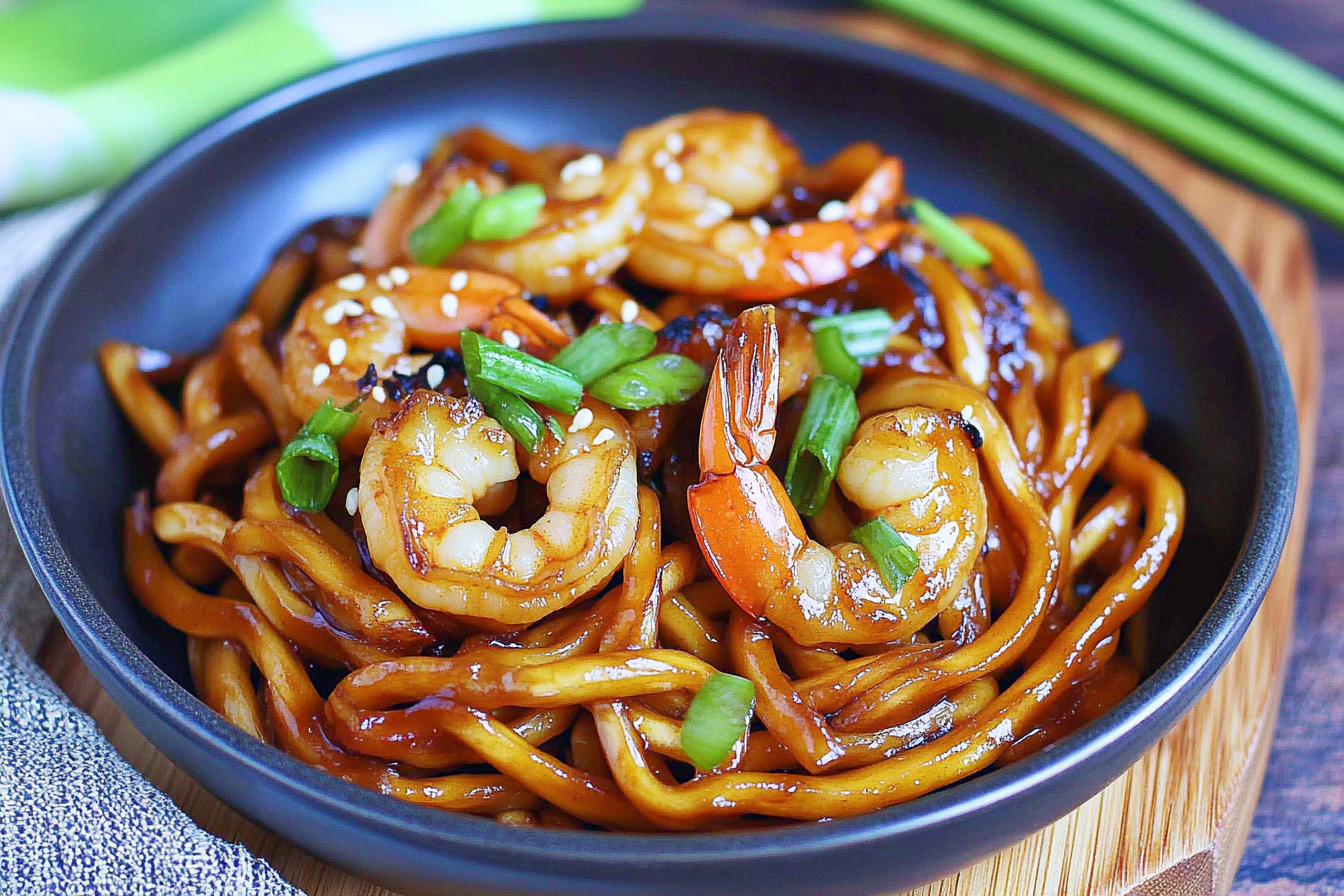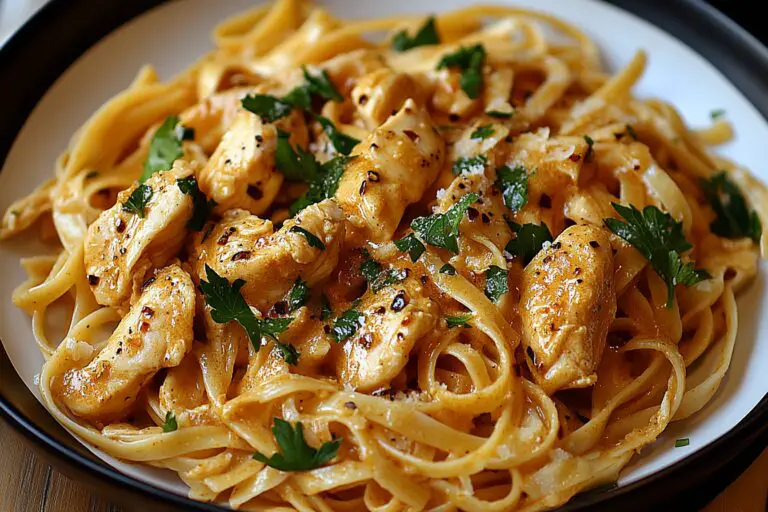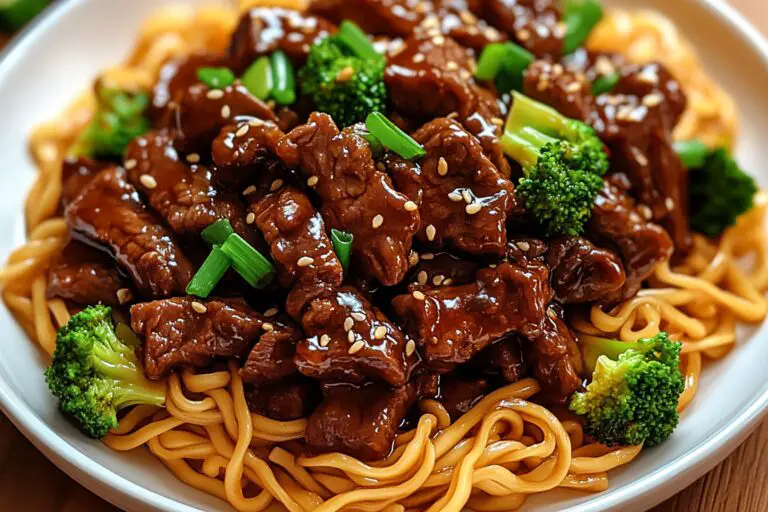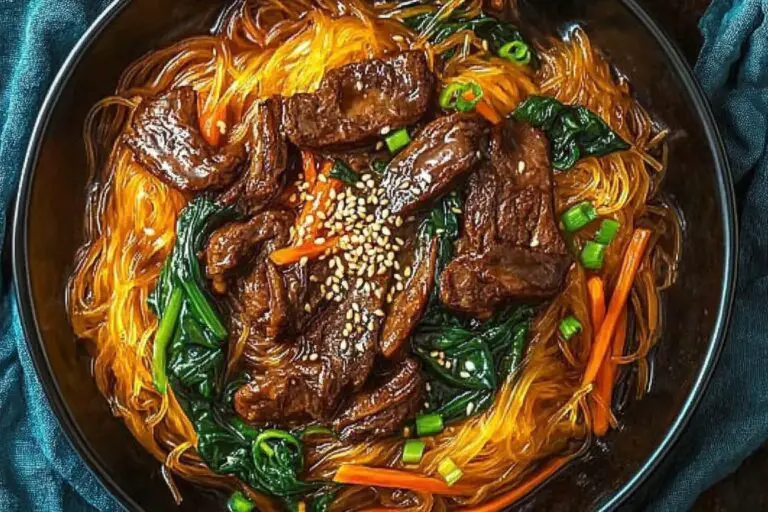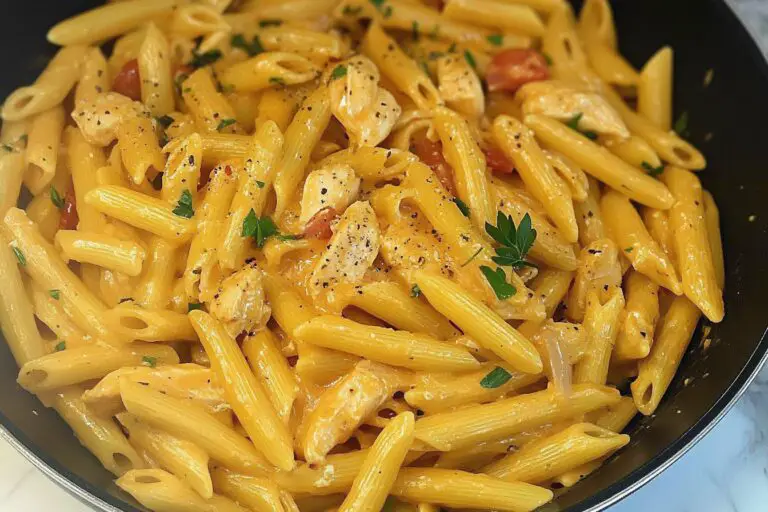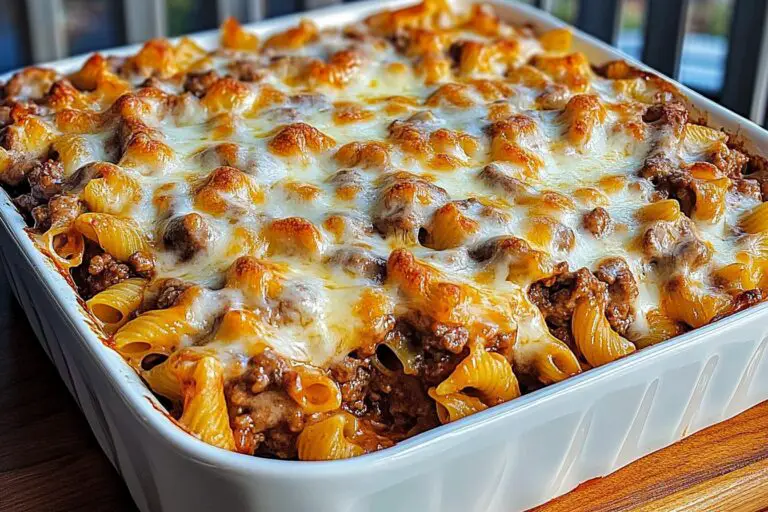Shrimp Yaki Udon
Introduction
Yaki Udon with shrimps is a delightful Japanese dish that combines thick udon noodles with succulent shrimp, vibrant vegetables, and a savory sauce. It’s a perfect meal for any occasion, offering a satisfying blend of flavors and textures. This dish is quick to prepare and can be enjoyed by food lovers of all ages. Let’s dive into the details of how to prepare this scrumptious meal.
Detailed Ingredients with measures
Udon noodles – 200 grams
Shrimp – 250 grams, peeled and deveined
Vegetable oil – 2 tablespoons
Garlic – 2 cloves, minced
Carrot – 1, julienned
Bell peppers – 1, sliced
Green onions – 2, chopped
Soy sauce – 3 tablespoons
Oyster sauce – 1 tablespoon
Mirin – 1 tablespoon
Sesame seeds – for garnishing
Prep Time
The prep time for Yaki Udon with shrimps is approximately 15 minutes. This includes the time taken to gather and prepare all the ingredients.
Cook Time, Total Time, Yield
Cook time is around 10 minutes, making the total time for this dish approximately 25 minutes. This recipe yields 2 servings, perfect for a cozy dinner or lunch. Enjoy the deliciousness of homemade Yaki Udon right from your kitchen!
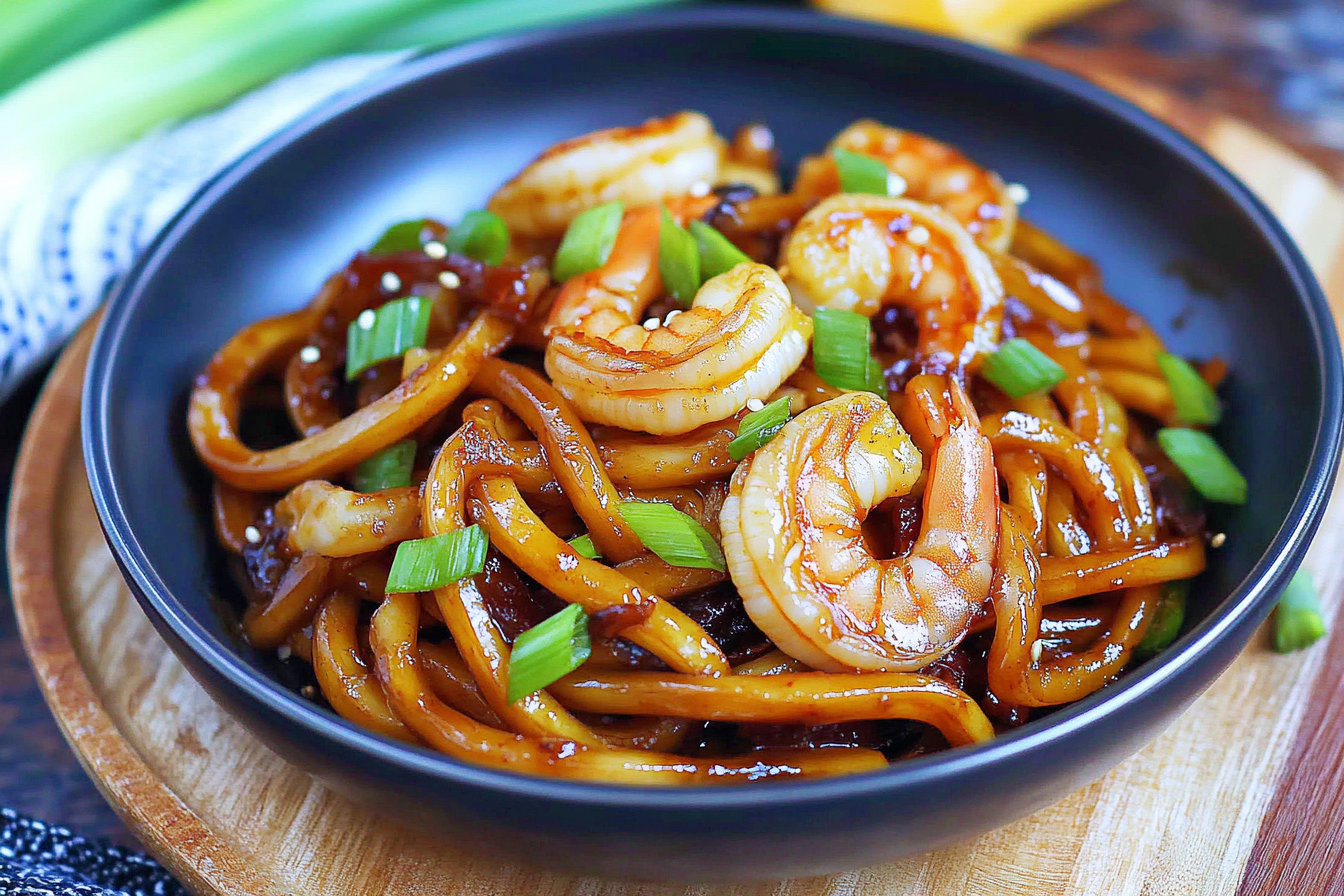
Detailed Directions and Instructions
Step 1: Prepare the Udon Noodles
Cook the udon noodles according to package instructions until al dente. Drain and rinse them under cold water to stop the cooking process, then set aside.
Step 2: Cook the Shrimp
In a large pan or wok, heat some oil over medium heat. Add the shrimp and cook them for 3-4 minutes until they turn pink and opaque. Remove the shrimp from the pan and set them aside.
Step 3: Sauté the Vegetables
In the same pan, add a bit more oil if needed and toss in sliced vegetables such as bell peppers, carrots, and broccoli. Sauté for about 5 minutes until they start to soften.
Step 4: Combine Ingredients
Add the cooked udon noodles and shrimp back into the pan with the sautéed vegetables. Stir to combine all ingredients.
Step 5: Add Sauce
Pour in a sauce mixture comprising soy sauce, mirin, and sesame oil. Stir thoroughly to evenly coat the noodles and ingredients. Cook for another 2-3 minutes until everything is heated through.
Step 6: Serve
Serve the yaki udon hot, garnished with sesame seeds and sliced green onions if desired.
Notes
Note 1: Noodle Type
Fresh or frozen udon noodles can be used for this recipe to achieve the best texture.
Note 2: Vegetable Options
Feel free to customize the vegetables based on your preference or what you have on hand.
Note 3: Sauce Adjustments
You can adjust the amount of soy sauce and mirin according to your taste for more or less saltiness.
Note 4: Protein Variations
If shrimp is not preferred, chicken, beef, or tofu can be substituted as the main protein.
Note 5: Leftovers
Leftovers can be stored in an airtight container in the refrigerator for up to 2 days. Reheat in a pan over low heat.
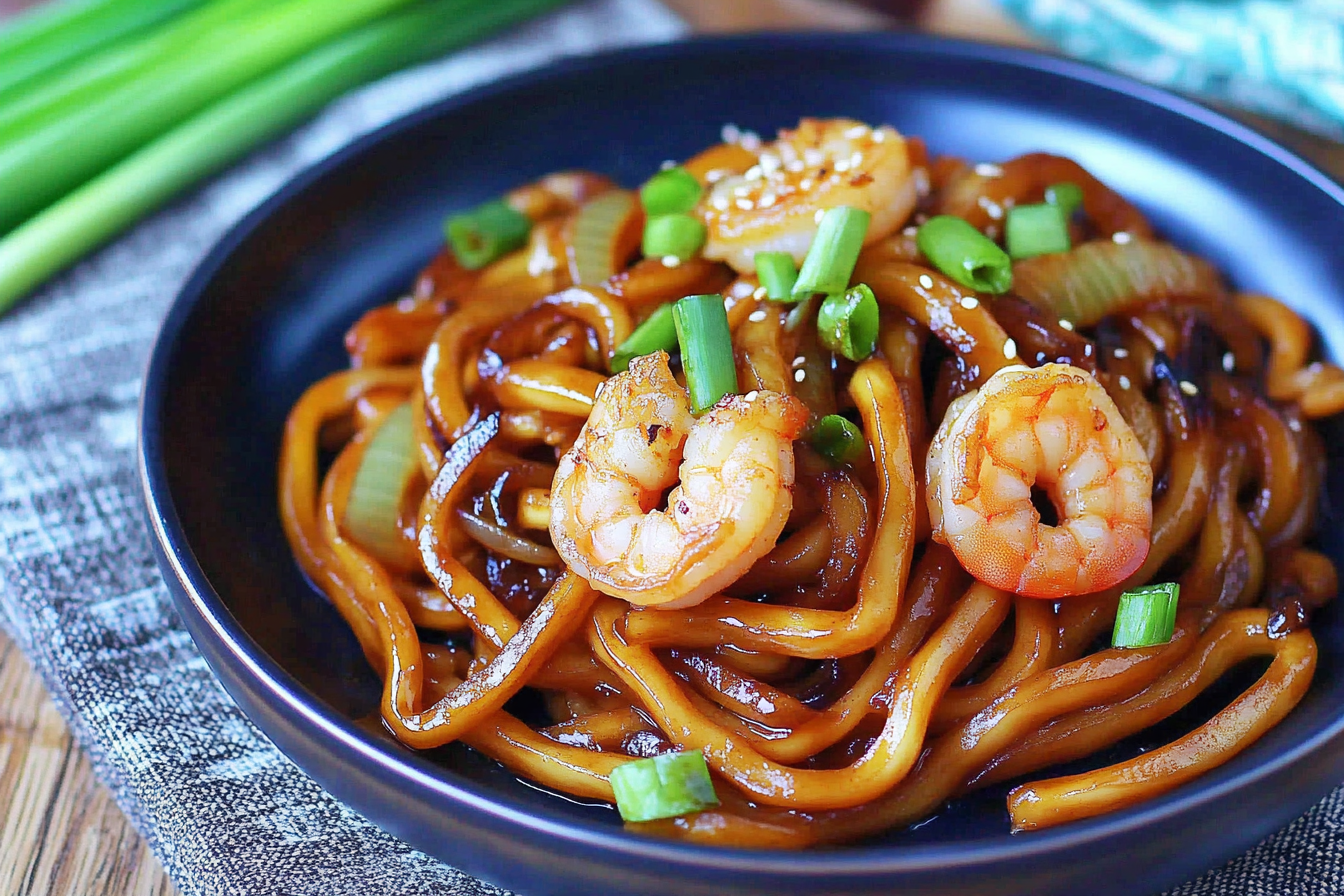
Cook techniques
Stir-frying
Stir-frying is a quick cooking method that involves frying ingredients in a wok or a large pan at high heat. This technique helps to retain the natural flavors and colors of the ingredients.
Marinating
Marinating involves soaking the shrimp in a mixture of ingredients to enhance flavor and tenderness. This technique infuses the protein with spices and other flavors before cooking.
Boiling noodles
Boiling noodles requires attention to timing to achieve the perfect texture. The noodles should be cooked until al dente, then drained and rinsed to stop the cooking process.
Seasoning
Proper seasoning involves using spices, sauces, and other flavorings to enhance the dish. It’s important to balance flavors to create a delicious meal.
Plating
Plating is an artistic technique that involves arranging food aesthetically on a plate. This enhances the presentation and makes the dish more appealing.
FAQ
Can I use other types of seafood instead of shrimp?
Yes, you can substitute shrimp with other seafood like chicken, beef, or tofu, depending on your preference.
What types of vegetables can I add to yaki udon?
You can add a variety of vegetables such as bell peppers, carrots, broccoli, or snap peas for added texture and nutrients.
How can I achieve a gluten-free version of yaki udon?
To make a gluten-free version, substitute regular udon noodles with gluten-free noodles and ensure the sauces used are gluten-free.
Is yaki udon suitable for meal prep?
Yes, yaki udon can be made in advance and stored in the refrigerator. Just be sure to reheat it thoroughly before eating.
Can I make yaki udon without a wok?
Absolutely! If you don’t have a wok, you can use a large frying pan to stir-fry the ingredients effectively.
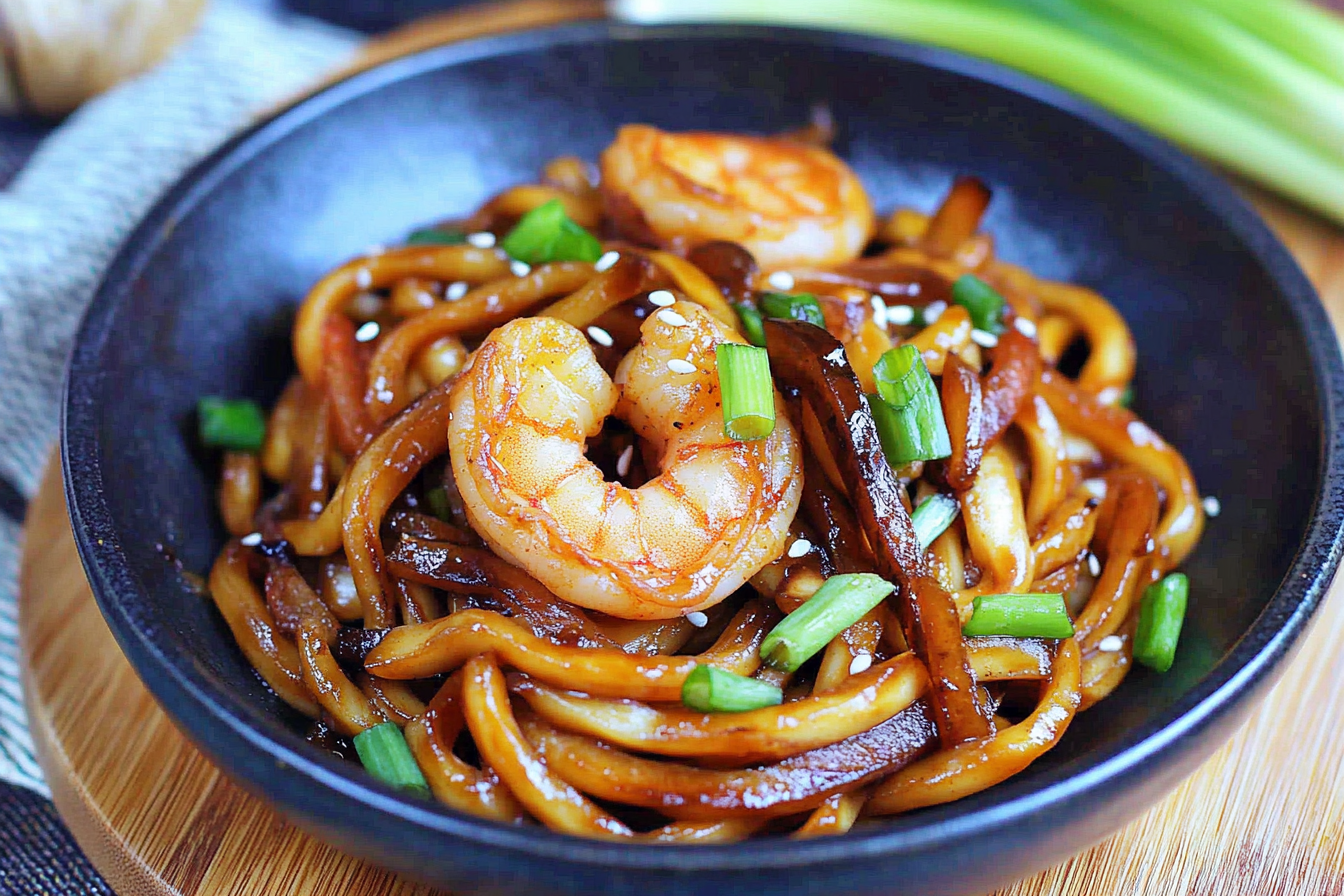
Conclusion
The Yaki Udon with Shrimps is a delightful dish that beautifully combines the flavors of tender shrimps, fresh vegetables, and chewy udon noodles, all enhanced by a savory sauce. This recipe is not only easy to prepare but also allows for customization, making it a versatile choice for any meal.
More recipes suggestions and combination
Vegetable Yaki Udon
A vegetarian version using an array of vibrant seasonal vegetables like bell peppers, broccoli, and mushrooms for a healthy twist.
Spicy Yaki Udon with Chicken
Incorporate grilled chicken and add some chili flakes or spicy sauce for those who enjoy a kick in their noodles.
Seafood Yaki Udon
Include a mix of seafood such as squid and scallops, along with shrimp, to create a hearty seafood pasta dish.
Tofu Yaki Udon
Substitute shrimps with marinated tofu for a plant-based protein option that is equally fulfilling.
Yaki Udon Stir-Fry Bowl
Transform the dish into a stir-fry bowl by adding a variety of garnishes like sesame seeds, scallions, and nori for extra flavor.
Yaki Udon with Peanut Sauce
Experiment with a creamy peanut sauce instead of traditional soy sauce for a rich and nutty taste.
Curry Yaki Udon
Add curry powder to the sauce for a unique fusion that combines the heartiness of Japanese noodles with Indian flavors.

